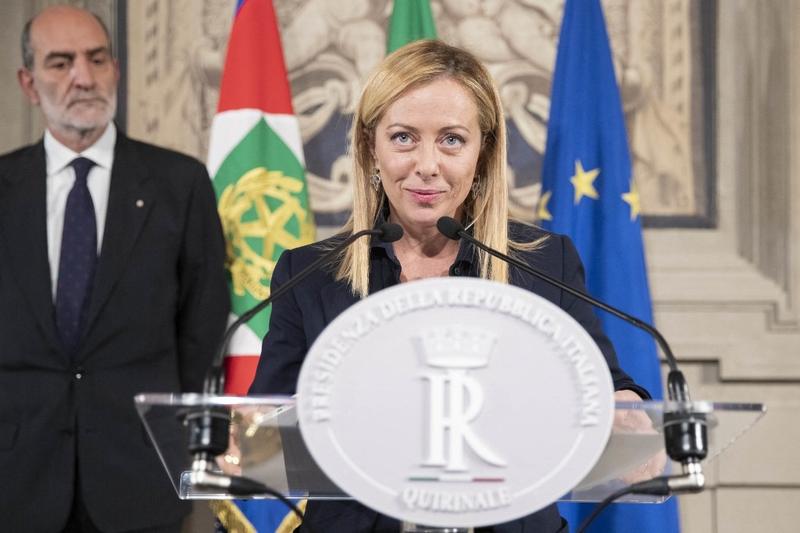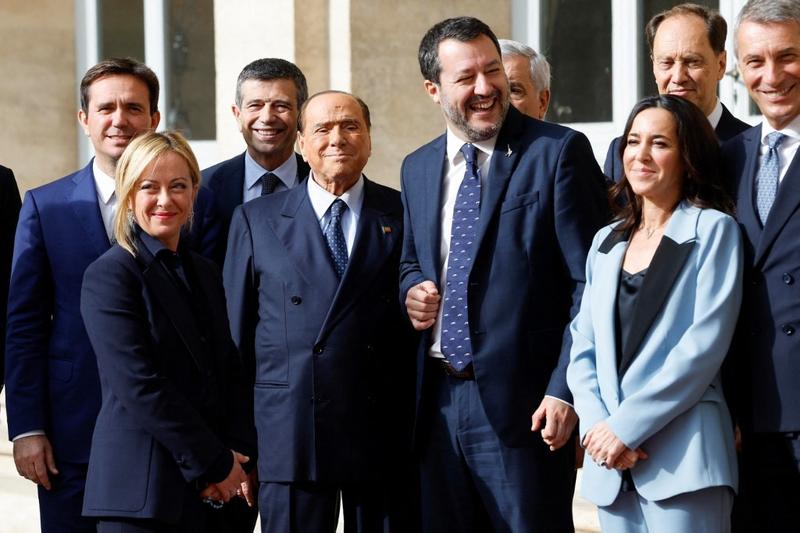 This handout picture taken and released by Quirinale Press Office on Oct 21, 2022 shows President of the Italian party Fratelli d'Italia and Italian Prime Minister-designate Giorgia Meloni addressing the media after a meeting with Italian President Sergio Mattarella at the Quirinale Palace in Rome. (FRANCESCO AMMENDOLA / QUIRINALE PRESS OFFICE / AFP)
This handout picture taken and released by Quirinale Press Office on Oct 21, 2022 shows President of the Italian party Fratelli d'Italia and Italian Prime Minister-designate Giorgia Meloni addressing the media after a meeting with Italian President Sergio Mattarella at the Quirinale Palace in Rome. (FRANCESCO AMMENDOLA / QUIRINALE PRESS OFFICE / AFP)
ROME – Giorgia Meloni, leader of the far-right populist Brothers of Italy (FdI) party, became Italy's first woman prime minister on Friday.
The official announcement came after she met with the country's President, Sergio Mattarella, at the Quirinale Presidential Palace here in the afternoon.
READ MORE: Italy election victors target era of political stability
Meloni received the mandate to form a new cabinet less than a month after her victory in the country's snap election on Sept 25.
Next week, the new government will face confidence votes in both houses of the parliament
Her new cabinet, which will include 22 ministers, will be sworn in on Saturday, Ugo Zampetti, secretary general of the Presidency of the Republic, told reporters.
Meloni's FdI party won 26 percent of the vote in September, and she will now lead the country in a right-wing alliance with Matteo Salvini's League party and former Prime Minister Silvio Berlusconi's center-right Forza Italia, each of which snagged just over 8 percent.
Next week, the new government will face confidence votes in both houses of the parliament.
ALSO READ: Far right taps jaded mood across EU
 President of the Italian party Fratelli d'Italia Giorgia Meloni (second left), former prime minister and leader of Forza Italia party Silvio Berlusconi (fourth left), Senator Licia Ronzulli (second right) and Italian Lega party leader Matteo Salvini (fourth right) leave after a meeting with Italian President Sergio Mattarella for the first round of formal political consultations for new government at the Quirinale Palace in Rome on Oct 21, 2022. (FABIO FRUSTACI / ANSA / AFP)
President of the Italian party Fratelli d'Italia Giorgia Meloni (second left), former prime minister and leader of Forza Italia party Silvio Berlusconi (fourth left), Senator Licia Ronzulli (second right) and Italian Lega party leader Matteo Salvini (fourth right) leave after a meeting with Italian President Sergio Mattarella for the first round of formal political consultations for new government at the Quirinale Palace in Rome on Oct 21, 2022. (FABIO FRUSTACI / ANSA / AFP)
Meloni's government is set to command a comfortable majority in both houses of the parliament (Chamber of Deputies and Senate).
The snap election in September was called after Mario Draghi – an economist and former chief of the European Central Bank – resigned as prime minister on July 21.



